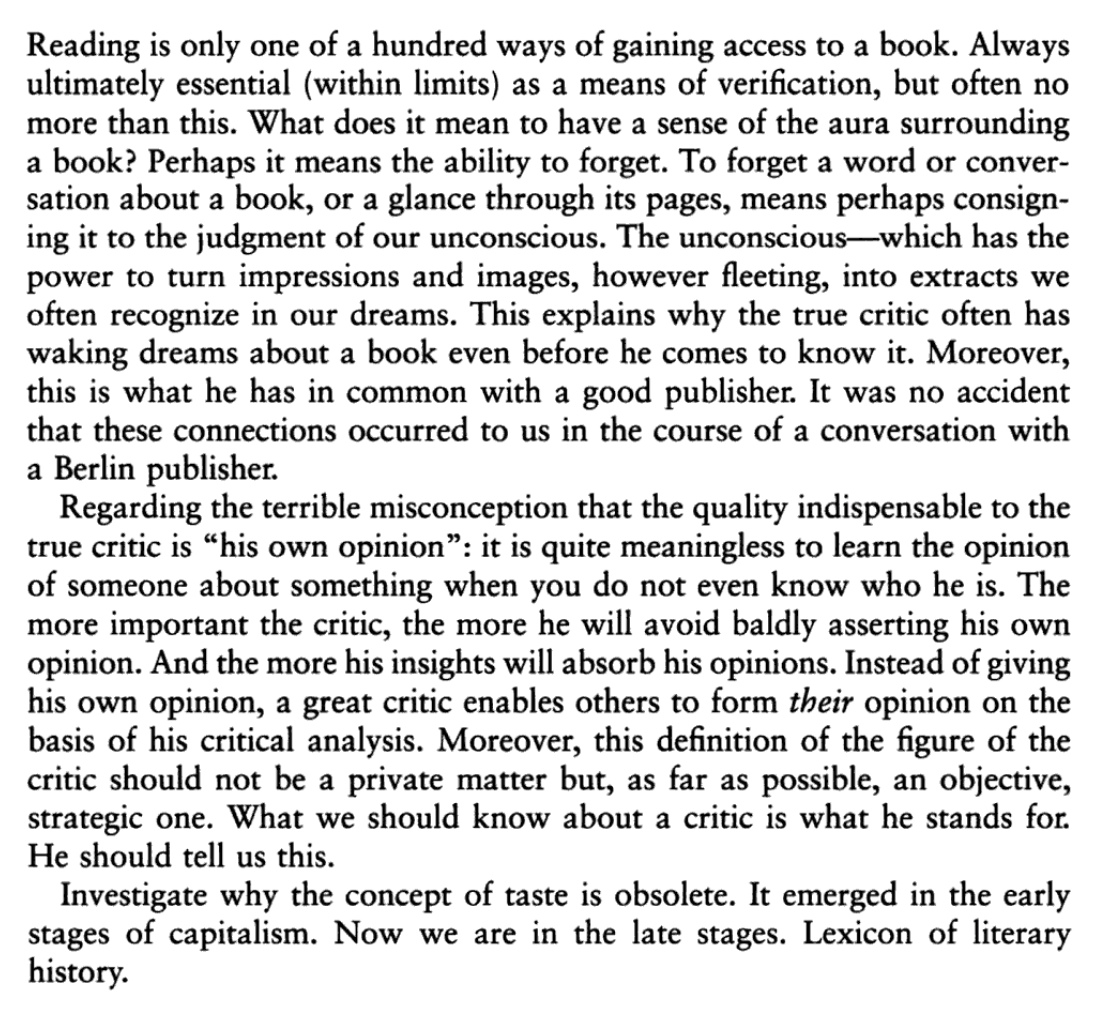
Whereby may be seen that nothing is so hard or so uncertaine to be found out as the certaintie of the truth, sithence no man can put any assured confidence concerning the truth of a battel, neither in the knowledge of him that was Generall or commanded over it, nor in the soldiers that fought, of anything that hath hapned amongst them; except after the manner of a strict point of law, the severall witnesses are brought and examined face to face, and that all matters be nicely and thorowly sifted by the objects and trials of the successe of every accident. Verily the knowledge we have of our owne affaires is much more barren and feeble. But this hath sufficiently been handled by Bodin, and agreeing with my conception. Somewhat to aid the weaknesse of my memorie and to assist her great defects; for it hath often been my chance to light upon bookes which I supposed to be new and never to have read, which I had not understanding diligently read and run over many years before, and all bescribled with my notes; I have a while since accustomed my selfe to note at the end of my booke (I meane such as I purpose to read but once) the time I made an end to read it, and to set downe what censure or judgement I gave of it; that so it may at least at another time represent unto my mind the aire and generall idea I had conceived of the Author in reading him. I will here set downe the Copie of some of my annotations, and especially what I noted upon my Guicciardine about ten years since: (For what language soever my books speake unto me I speake unto them in mine owne.) He is a diligent Historiographer and from whom in my conceit a man may as exactly learne the truth of such affaires as passed in his time, as of any other writer whatsoever: and the rather because himselfe hath been an Actor of most part of them and in verie honourable place.
--Michel de Montaigne, "Of Bookes"
--Walter Benjamin

Reflections; or Sentences and Moral Maxims By Francois Duc De La Rochefoucauld, Prince de Marsillac..
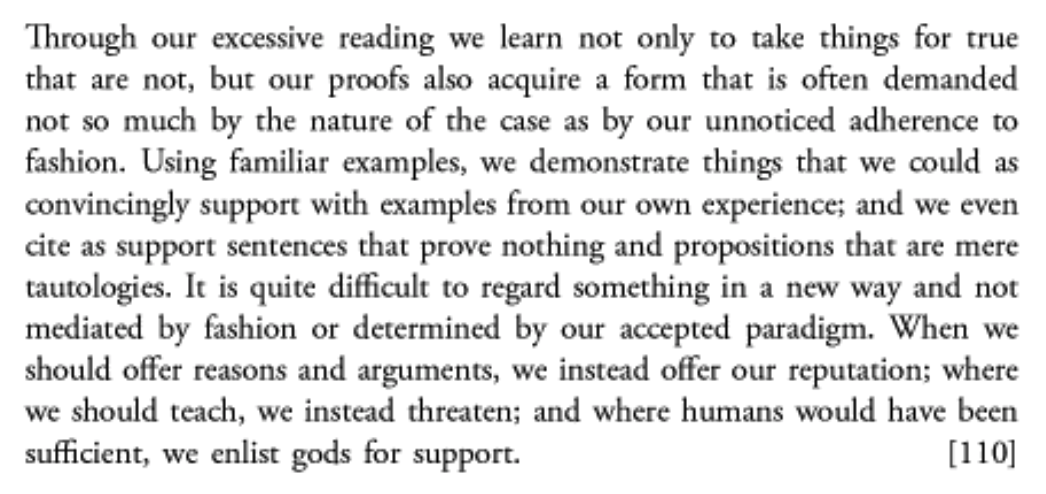
Georg Christoph Lichtenberg, "Introduction" The Waste Books, pp. vii-15
"Scholars spend all their energy saying yes and no, criticizing what other people have already thought, - they do not think for themselves any more . . . Their instinct for self-defence has worn out, otherwise they would be defending themselves from books. The scholar a decadent. - I have seen it with my own eyes: natures that are gifted, rich, and disposed to be free, already 'ruined by reading' in their thirties, just matches that have to be struck to emit sparks - 'thoughts'. Early in the morning, at the break of day, when everything is fresh, in the dawn of your strength, to read a book - that is what I call depraved! - - "
Friedrich Nietzsche, Ecce Homo
Arthur Schopenhauer, "Thinking for Oneself," in PARERGA AND PARALIPOMENA, VOLUME 2 Chapter 22
ANTHONY GOTTLIEB, "Montaigne’s Moment," MARCH 10, 2011
January 10: Nothing is Due (Because It's Thursday).
January 11: Nothing Is Required (Because It's Friday).
Recommended:
Beaten tracks; or, Pen and pencil sketches in Italy. By the authoress ... Tuckett, Elizabeth.
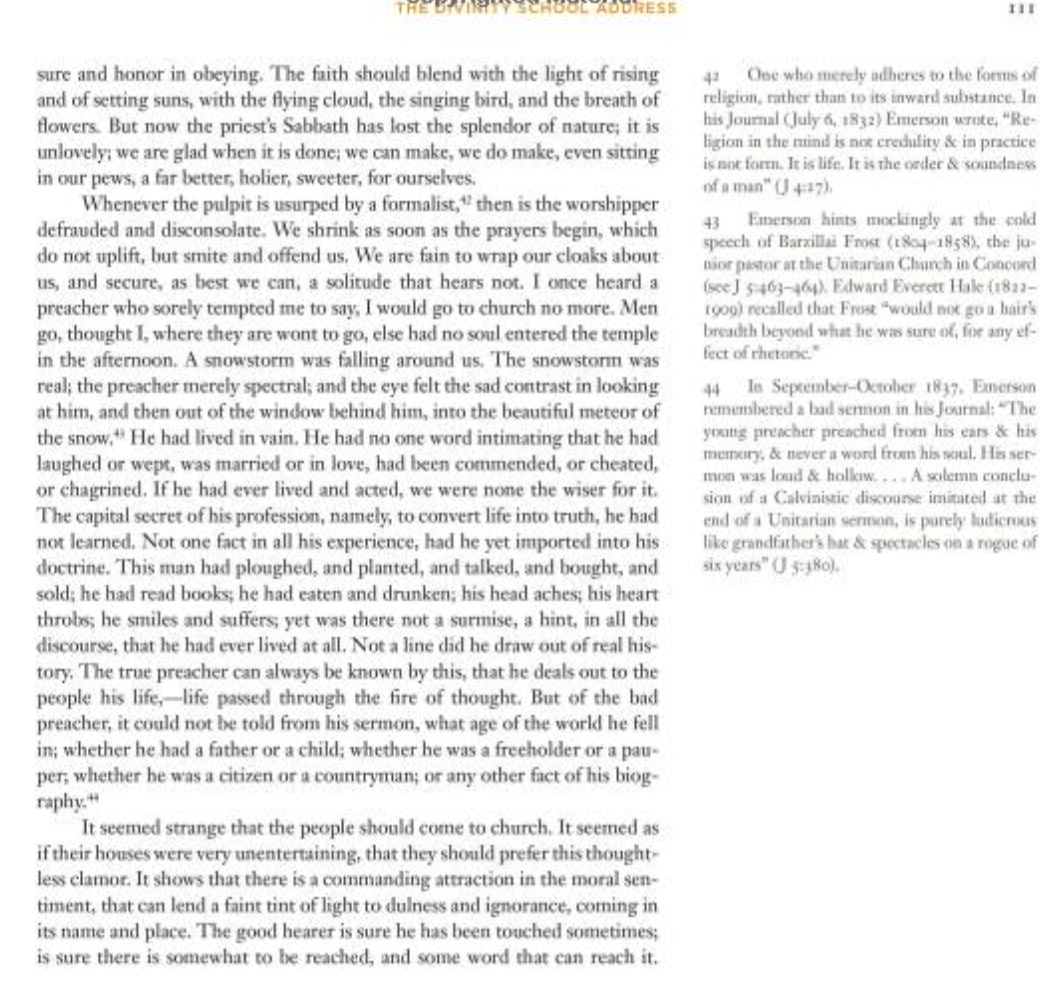
--Ralph Waldo Emerson, "The Divinity School Address"
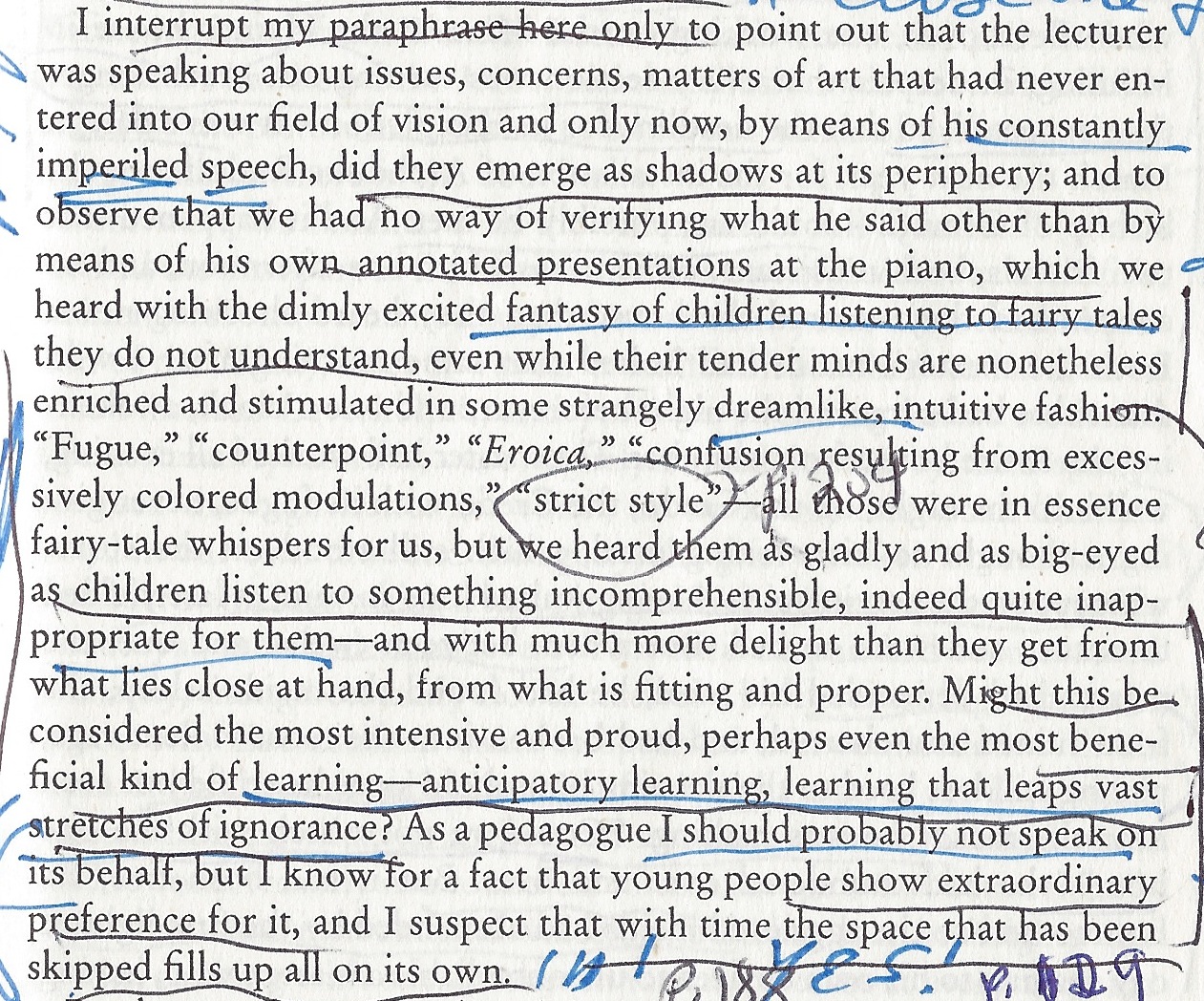
-- Thomas Mann, Doktor Faustus, p. 63.
Why James Baldwin's 'A Talk To Teachers' Remains Relevant 54 Years Later
the-desegregation-and-resegregation-of-charlottes-schools
There is too much here to try to unravel. But here are some of the threads: The words “inadvertently” and “automatically,” however recondite, are ordinary; there are ordinary contexts (nontechnical, nonpolitical, nonphilosophical contexts) which are normative for their use. It may be that half the speakers of English do not know (or cannot say, which is not the same) what these contexts are. Some native speakers may even use them interchangeably. Suppose the baker is able to convince us that he does. Should we then say: “So the professor has no right to say how ‘we use’ ‘inadvertently,’ or to say that when we use the one word we say something different from what we say when we use the other”? Before accepting that conclusion, I should hope that the following consideration would be taken seriously: When “inadvertently” and “automatically” seem to be used indifferently in recounting what someone did, this may not at all show that they are being used synonymously, but only that what each of them says is separately true of the person’s action. The decanter is broken and you did it. You may say (and it may be important to consider that you are already embarrassed and flustered) either: “I did it inadvertently’’ or “I did it automatically.” Are you saying the same thing? Well, you automatically grabbed the cigarette which had fallen on the table, and inadvertently knocked over the decanter. Naming actions is a sensitive occupation. It is easy to overlook the distinction because the two adverbs often go together in describing actions in which a sudden movement results in some mishap. Suppose the baker does not accept this explanation, but replies: “Iuse ‘automatically’ and ‘inadvertently’ in exactly the same way. I could just as well have said: ‘I grabbed the cigarette inadvertently and knocked over the decanter automatically.’” Don’t we feel the temptation to reply: “You may say this, but you can’t say it and describe the same situation; you can’t mean what you would mean if you said the other”? But suppose the baker insists he can? Will we then be prepared to say: “Well you can’t say the one and mean what I mean by the other”? Great care would be needed in claiming this, for it may look like I am saying, “I know what I mean and I say they are different.” But why is the baker not entitled to this argument? What I must not say is: “I know what words mean in my language.” Here the argument would have pushed me to madness. It may turn out (depending upon just what the dialogue has been and where it was stopped) that we should say to the baker: “If you cooked the way you talk, you would forgo special implements for different jobs, and peel, core, scrape, slice, carve, chop, and saw, all with one knife. The distinction is there, in the language (as implements are there to be had), and you just impoverish what you say by neglecting it. And there is something you aren’t noticing about the world.”
--Stanley Cavell, "Must-We-Mean-What-We-Say?"
An old, mad, blind, despised, and dying King;
Princes, the dregs of their dull race, who flow
Through public scorn,—mud from a muddy spring;
Rulers who neither see nor feel nor know,
But leechlike to their fainting country cling
Till they drop, blind in blood, without a blow.
A people starved and stabbed in th' untilled field;
An army, whom liberticide and prey
Makes as a two-edged sword to all who wield;
Golden and sanguine laws which tempt and slay;
Religion Christless, Godless—a book sealed;
A senate, Time’s worst statute, unrepealed—
Are graves from which a glorious Phantom may
Burst, to illumine our tempestuous day.
All linked readings will take you to a pdf. For all readings by Ralph Waldo Emerson, you will need need to a copy of The Annotated Emerson. You must have this edition, not another, and bring it with you to class.

For the readings by Michel de Montaigne, I recommend
either Michel de Montaigne, The Complete Works (Everyman's Library)

Or:
Michel de Montaigne - The Complete Essays (Penguin Classics) Penguin Classics

Other interesting editions include
There is an older edition online here.
The Montaigne Project has all editions of the Essays (in French) here.
Comment Montaigne écrivait ses Essais : l’Exemplaire de Bordeaux
Les "Essais" de Montaigne. Un exemplaire exceptionnel sur Gallica
Autour l'auteur:
The most recent French edition is here: Essais, Montaigne Gallimard)
You will also need a copy of Friedrich Nietzsche's, Anti-Education: On the Future of Our Educational Institutions
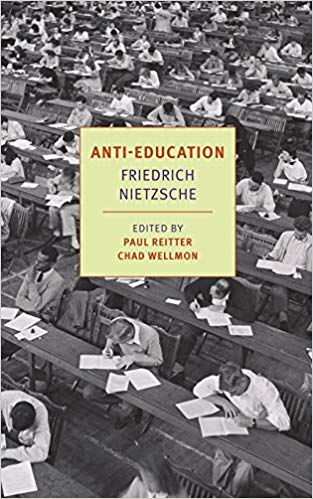
PDFS of the other recommended Nietzsche translations below (Stanford UP and Cambridge UP) may be found for free online.
PERCY BYSSHE SHELLEY, "England in 1819"